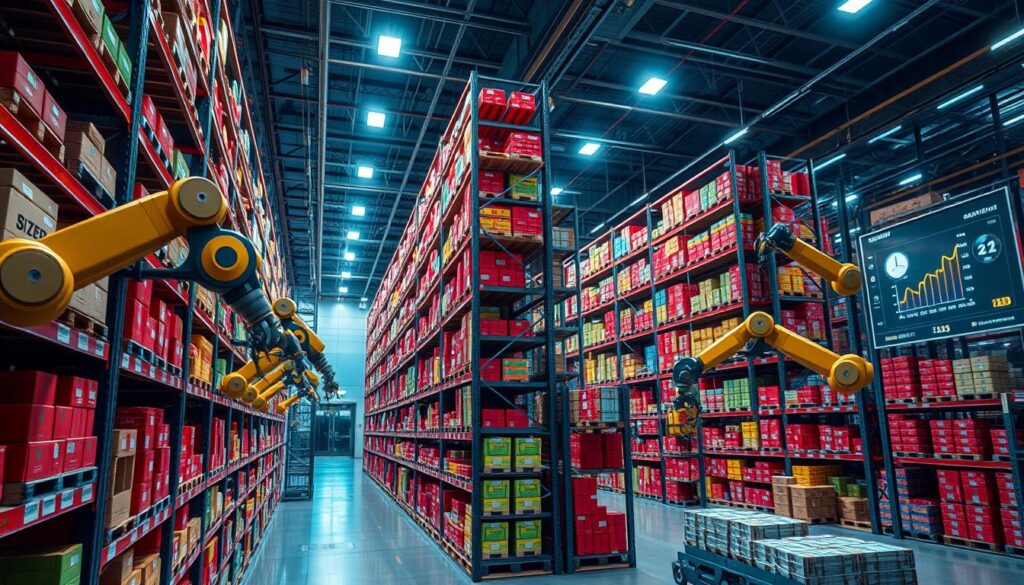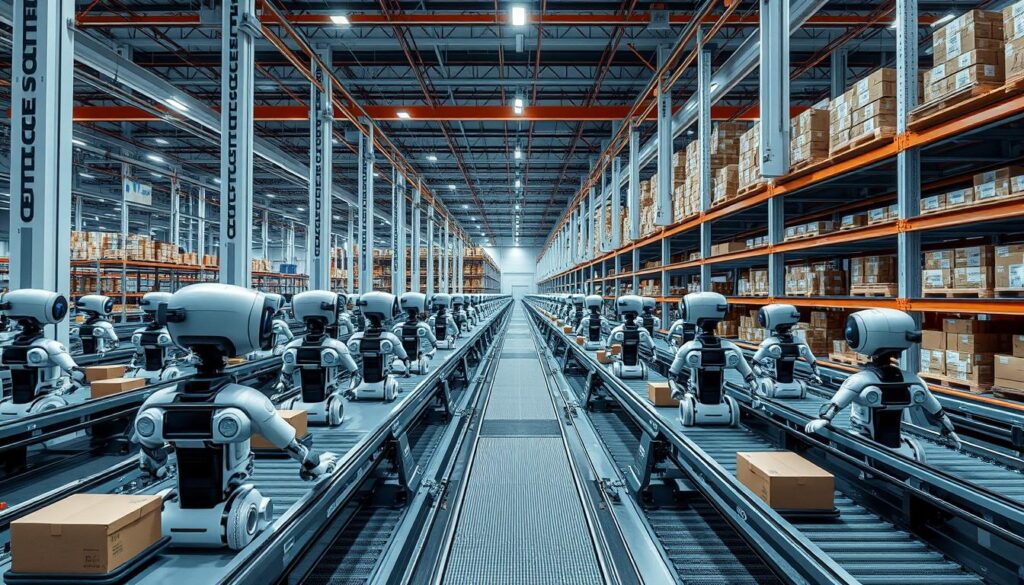AI technology has changed the eCommerce world, making operations more efficient. It helps manage inventory, logistics, transportation, and supplier relationships better. This makes the whole supply chain smooth and automatic. Using AI, companies can understand things deeply, manage stock well, and meet market needs fast. This leads to happier customers.
AI makes supply chain work better and fits what customers want today. A survey showed 75% of buyers choose free over fast shipping. Walmart’s big step into eCommerce boosted its sales by 21%. These facts show how vital AI is. It keeps businesses ahead by matching what consumers want.
Key Takeaways
- AI technology enhances operational efficiency in eCommerce supply chains.
- Streamlining operations with AI enables better inventory and logistics management.
- Integration of AI helps businesses to respond quickly to market demands.
- 75% of consumers prioritize free shipping over fast shipping.
- Walmart Inc.’s eCommerce sales have increased by 21% year-over-year due to AI and automation.
Introduction to AI in Supply Chain Management
The advent of AI has greatly changed the way eCommerce works. Integrating AI into supply chain management helps companies understand huge amounts of data. This gives them insights into what customers like and want. The use of AI brings many benefits such as better demand forecasting, managing inventory well, and making operations more efficient.
For example, predictive analytics tools that use AI can look at past sales and market trends. This lets them predict future demands very accurately. Having the right amount of stock helps avoid having too much or too little. Also, using AI in logistics makes route planning better. This means faster deliveries and lower shipping costs.
An insight into the AI Supply Chain Introduction:
- Demand Forecasting: AI figures out what customers might want, helping stores keep the right amount of items.
- Inventory Management: AI helps make sure there’s always just enough stock, not too much or too little.
- Operational Efficiency: AI automates warehouse tasks, cutting down on manual work and mistakes.
Moreover, AI helps logistics by ensuring delivery trucks take the best routes. This saves time and gas, especially in cities where traffic is heavy. AI changes routes as needed based on live data. This keeps the supply chain moving smoothly and efficiently.
Optimizing Inventory Management with AI
In today’s supply chain world, AI inventory systems have changed how companies manage their stock. These technologies help achieve great efficiency and accuracy. It’s a big step forward in managing inventories.

Predictive Analytics for Inventory Control
Predictive analytics helps businesses forecast market demands better. It looks at past data and buying trends. Then, AI gives precise predictions for stocking needs. This reduces extra inventory while meeting customer demands quickly.
- Usage of historical data to predict future demands
- Reduction in excess inventory and associated carrying costs
- Enhanced decision-making capabilities
Minimizing Stockouts and Overstock Situations
AI stock control helps avoid too much or too little stock. It does this by predicting demand and adjusting inventory. This makes for a balanced inventory, cuts costs, and boosts customer happiness.
| Challenges | AI Solutions | Benefits |
|---|---|---|
| Frequent stockouts | Predictive analytics | Better demand forecasting, reduced stockouts |
| Overstock situations | AI-driven reorder levels | Optimal inventory levels, cost reduction |
| Manual stock control | Automated inventory management | Improved accuracy, time savings |
Enhancing Logistics and Transportation with AI
In the fast-changing world of supply chain management, using AI for logistics and transportation is key. AI helps with planning the best routes and schedules. This boosts how well things run and makes customers happier.
Route Optimization and Smart Deliveries
AI tools change delivery routes in real-time to skip traffic jams. This makes sure deliveries are on time. They use algorithms and traffic data to make deliveries smarter.
Take McDonald’s as an example. They used AI in geofencing technology to manage logistics on the go. This increased how well they operate and made customers happier by cutting down delays.
According to industry data:
- 70% of automotive service technicians depend on some level of technology in their daily tasks.
- 87% of surveyed technicians state that digital data and analytics build customer trust and improve satisfaction.
- Anyline’s technology is utilized by major automotive and tire manufacturers and retailers.
Reducing Operational Costs Through Automation
Using AI in Transportation Management cuts down on costs a lot. It gets rid of mistakes made by people, makes complicated tasks simpler, and boosts overall efficiency. This lets people focus on more important work.
Companies can save a lot by automating simple tasks like data entry. 72% of technicians think entering data by hand takes too long. Using AI can remove these slow steps and save a lot of time and money.
- 46% of respondents cite a technician shortage as a challenge they will face in the next decade.
- 72% of technicians find manual data entry time-consuming.
- 57% of technicians still manually log tire information into point-of-sale systems and CRM platforms.
| Technological Dependency | Benefit |
|---|---|
| 70% Automotive Service Technicians | Enhanced efficiency due to technology |
| 87% Surveyed Technicians | Improved customer trust and satisfaction |
| 72% Technicians on Manual Data Entry | Time-consuming tasks can be automated |
AI Supply Chain Automation: Real-Time Monitoring and Adaptation
The use of Real-Time AI Supply Chain solutions is changing how companies handle their logistics. With AI technologies, they can closely track their supply chains. This means they can quickly adjust to changes or problems. Being able to act fast helps reduce delivery delays and cost issues.
Thanks to AI Monitoring in Logistics, old tracking ways are becoming obsolete. AI can sift through huge data piles in seconds, offering insights quickly. This speed boosts the decision-making process and makes supply chains run smoother. Also, AI predicts future hurdles by checking things like traffic, weather, and how much stock is left.
Using Automated Supply Chain Solutions has many advantages. Businesses have seen faster processing and better efficiency. By automating regular jobs, like orders and keeping track of stock, companies can focus on growth. Here are some key benefits these technologies provide:
| Benefit | Description |
|---|---|
| Instantaneous Tracking | Real-time data analytics allow for immediate updates and tracking of goods throughout the supply chain. |
| Cost Efficiency | Reduced operational costs through automation and quicker resolution of disruptions. |
| Improved Decision-Making | Enhanced ability to make data-driven decisions by analyzing real-time information. |
| Customer Satisfaction | Faster and more accurate deliveries lead to higher customer satisfaction rates. |
AI’s role in supply chains is only going to get bigger, offering more Automated Supply Chain Solutions. Keeping up with AI advancements helps companies stay competitive. It’s key to making the most out of Real-Time AI Supply Chain and AI Monitoring in Logistics.
Improving Supplier Relations with AI
AI is changing the way companies work with suppliers. It brings more efficiency and clearness. It helps in managing contracts and reduces risks.
Smart Contract Management
Smart Contracts AI is making supplier deals better. It automates overseeing contracts, making sure all parts are met without mistakes. It speeds up the process, building trust and strong connections with suppliers.
Risk Assessment and Mitigation
Handling risks in the supply chain is key for a safe and steady operation. AI predicts risks and plans how to lessen them. It uses detailed analytics to help companies stay ready and keep their supply chain reliable.
Let’s look at the Q3 2024 financial details from top companies:
| Company | Q3 2024 Revenue | Year-over-Year Growth |
|---|---|---|
| Axon | $544 million | 32% |
| TransAct Technologies | $10.9 million | -37% |
Axon’s 32% revenue jump shows how AI can boost business. On the opposite, TransAct Technologies saw a drop, highlighting the need for better AI in managing suppliers and risks.
Data-Driven Decision Making in eCommerce Supply Chains
Using data wisely is key in today’s supply chain management. Big Data brings strategic insights, improving efficiency and keeping up with market trends. AI tools turn this data into steps we can act on. These tools help eCommerce respond to what customers want and follow the latest trends.
Leveraging Big Data for Strategic Insights
Big Data lets businesses collect lots of information from different places. This information helps understand what customers like and spot trends and issues in operations. For example, the need for light and strong materials like polystyrene is growing in the automotive and electronics industries. This shows how Big Data helps in many fields.
| Annual Growth | Market Size | Key Players |
|---|---|---|
| 3.1% CAGR (2024-2028) | USD 885.9 million (Europe, 2024-2028) | Alpek SAB de CV, Arkema SA, BASF SE, DuPont de Nemours Inc. |
Implementing AI-Powered Business Intelligence Tools
AI tools are revolutionizing eCommerce by making data analysis automatic. These tools give insights that improve inventory, forecast market shifts, and boost customer happiness. For instance, AI helps the RTD coffee market grow by letting companies like Starbucks and PepsiCo personalize products and marketing. Hence, staying relevant to customer desires.
| Market Size (2024-2028) | Growth Rate | Key Segments |
|---|---|---|
| USD 14.92 billion | 8.89% CAGR | Packaging, Distribution Channel, Geography |
Conclusion
We’ve learned a lot about AI’s big role in making eCommerce supply chains better. It makes managing stock smarter and fixing delivery faster. AI’s watchful eye makes sure everything runs smoothly and saves money.
Looking ahead, AI’s role in supply chains looks bright thanks to companies like EPAM Systems. EPAM’s work led to a big jump in their earnings, with revenues reaching $1.17 billion in Q3. This success story shows how powerful AI can be for eCommerce’s supply chain.
As AI gets smarter, it’s key for businesses to keep up by using AI. Talks at the Fortune Global Forum, led by big names like Boris Johnson, stress AI’s big impact on business and investments. A strong, smart supply chain is crucial as we go forward. Embracing AI is not just good—it’s necessary.
FAQ
How has AI impacted customer interaction in eCommerce?
What role does AI play in supply chain management?
How does predictive analytics help in inventory management?
In what ways does AI optimize logistics and transportation?
What benefits does real-time monitoring provide in supply chain management?
How does AI enhance supplier relationship management?
What role does Big Data play in strategic decision-making within the supply chain?
Why is AI crucial for maintaining efficient supply chains in eCommerce?
Source Links
- https://www.logisticsmgmt.com/article/fedex_white_paper_drives_home_the_importance_of_free_delivery_for_consumers
- https://www.insidermonkey.com/blog/walmart-inc-wmt-nationwide-same-day-pharmacy-delivery-1386915/
- https://www.prnewswire.com/news-releases/survey-shows-automotive-service-technicians-want-more-data-driven-tools-302298209.html
- https://www.prnewswire.com/news-releases/renewal-by-andersen-most-awarded-brand-in-the-jd-power-windows-and-patio-doors-satisfaction-study-302299397.html
- https://www.aol.com/why-epam-systems-rallied-today-210444025.html
- https://www.cognizant.com/us/en/insights/podcasts
- https://www.mdpi.com/2079-6374/14/11/541
- https://www.forbes.com/councils/forbesfinancecouncil/2024/11/07/propel-your-business-forward-with-these-technology-trends/
- https://www.stocktitan.net/news/TACT/trans-act-technologies-reports-preliminary-third-quarter-2024-1yxew87w953r.html
- https://www.itnewsonline.com/PRNewswire/Axon-reports-Q3-2024-revenue-of-USD544-million-up-32Percent-year-over-year-raises-outlook/1021195
- https://www.prnewswire.com/news-releases/polystyrene-ps-market-in-europe-to-grow-by-usd-885-9-million-from-2024-2028–driven-by-rising-demand-in-electronics-and-ai-powered-market-evolution—technavio-302297185.html
- https://www.prnewswire.com/news-releases/ready-to-drink-coffee-market-to-grow-by-usd-14-92-billion-from-2024-2028–as-demand-for-on-the-go-refreshments-rises-with-ai-driven-market-transformation—technavio-302297725.html
- https://www.prnewswire.com/news-releases/fortune-adds-prestigious-dynamic-speakers-to-global-forum-agenda-302299434.html
- https://www.prnewswire.com/news-releases/precipitated-calcium-carbonate-market-to-grow-by-usd-2-38-billion-from-2024-2028–as-demand-in-paper-industry-rises-with-ai-powered-market-evolution—technavio-302297823.html



